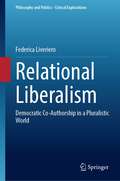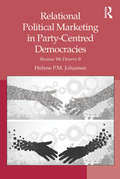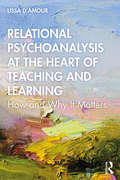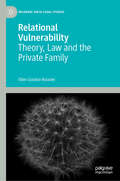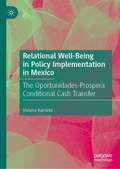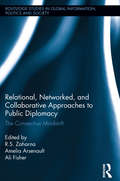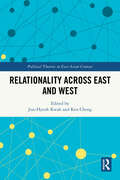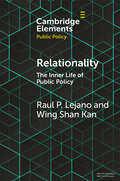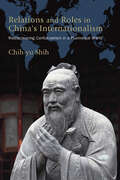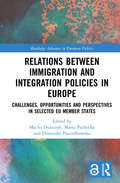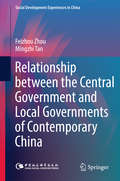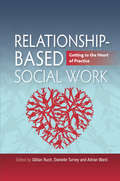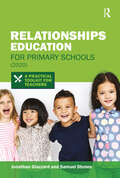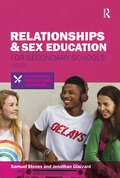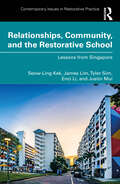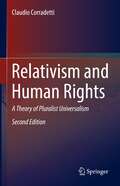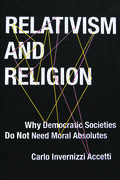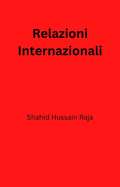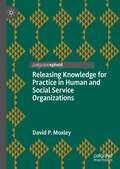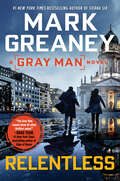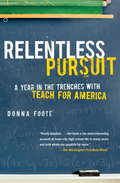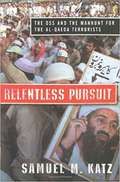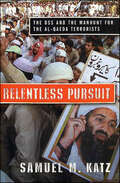- Table View
- List View
Relational Liberalism: Democratic Co-Authorship in a Pluralistic World (Philosophy and Politics - Critical Explorations #24)
by Federica LiverieroThis book investigates the unresolved issue of democratic legitimacy in contexts of pervasive disagreement and contributes to this debate by defending a relational version of political liberalism that rests on the ideal of co-authorship. According to this proposal, democratic legitimacy depends upon establishing appropriate interactions among citizens who ought to ascribe to one another the status of putative practical and epistemic authorities. To support this relational reading of political liberalism, the book proposes a revised account of the civic virtue of reasonableness along with an investigation of the epistemic-specific dimension of political equality. By engaging with political epistemology and social theory, this book explores ways to address inherent tensions within the liberal paradigm, using the following strategies of addressing these tensions: first, it defends a twofold model of legitimacy that distinguishes the goals, methodologies, and justificatory tasks of both ideal and nonideal phases of the two-level justificatory framework; second, it contends that democratic legitimacy requires an engaged and contextual critical appraisal of the injustices that characterize our daily social lives, illustrating how structural forms of injustice represent a profound betrayal of the liberal ideal of democratic legitimacy.
Relational Political Marketing in Party-Centred Democracies: Because We Deserve It
by Helene P.M. JohansenThis book offers a critical re-thinking of the way in which traditional market logic - derived from mainstream economics and managerial marketing - has for decades commonly been applied in the theoretical understanding of democratic politics within influential quarters of political science and in later years also the relatively new but rapidly expanding field of political marketing. Such approaches are founded on the assumption that all markets are driven exclusively by exchange dynamics and this has in turn rendered the most basic workings of co-production and participation-oriented party-centred political systems theoretically invisible. The author starts by providing a thorough and wide-ranging critical assessment of the theoretical underpinnings of the contemporary political marketing literature and its market-based political science antecedents. Using a relationship marketing perspective the author goes on to offer a re-conceptualisation of these political spheres in terms of 'markets' which addresses the theoretical inadequacies of prior research. She closes by examining some of the most important practical implications that this alternative approach to party-centred politics may have for the marketing efforts of contemporary membership parties. This book is essential reading to all those interested in party-centred politics and political marketing, as well as democratic theorists and students of political theory in general.
Relational Psychoanalysis at the Heart of Teaching and Learning: How and Why it Matters
by Lissa D’AmourThis book introduces the insights of contemporary relational psychoanalysis to educational thought and uses them as the foundation for a comprehensive model for understanding and informing teaching and learning practice. The model integrates what we know about conscious thought, motivation, and the physical body and translates these understandings in ways that are meaningful and relevant to the circumstances of practicing teachers, school leaders, and teachers of teachers. It will be of great interest to them and to those educational scholars whose attentions turn to the exigencies of the current era. Echoing calls for inclusivity, the book stands against admonishing anyone on the right way to be a person. Instead it emphasises understanding and, in understanding, practicing well. Readers will gain a deeper appreciation of the nature of sense-making and awareness and of the practical implications of cognition as embodied, life forms as non-linear dynamic systems, and relationships as core to human development and classroom life. It was Einstein who, in a letter to Freud, once asked for an educational solution to the menace of war. Today’s urgencies – of nations divided, diminishing planetary resources, and certain ecological disasters – press for wisdom beyond our collective habit. Thankfully the once-elusive mysteries of life, mind, learning, and learning systems now yield in ways to help shape answers to Einstein’s question. Relational psychoanalysts, psychotherapists, educational theorists, teachers, and those who work with them will be intrigued by the convergences and heartened at the possibilities.
Relational Vulnerability: Theory, Law and the Private Family (Palgrave Socio-Legal Studies)
by Ellen Gordon-BouvierThis book breaks new theoretical ground by constructing a framework of ‘relational vulnerability’ through which it analyses the disadvantaged position of those who undertake unpaid caregiving, or ‘dependency-work’, in the context of the private family. Expanding on existing socio-legal scholarship on vulnerability and resilience, it charts how the state seeks to conceal the embodied and temporal reality of vulnerability and dependency within the private family, while promoting an artificial concept of autonomous personhood that exposes dependency-workers work to a range of harms. The book argues that the legal framework governing the married and unmarried family reinforces principles of individualism and rationality, while labelling dependency-work as a private, gendered, and sentimental endeavor, lacking value beyond the family. It also considers how the state can respond to relational vulnerability and foster resilience. It seeks to provide a more comprehensive understanding of resilience, theorising its normative goals and applying these to different hypothetical state responses.
Relational Well-Being in Policy Implementation in Mexico: The Oportunidades-Prospera Conditional Cash Transfer
by Viviana RamírezThis book provides key insights into the nature of officer–recipient relationships and shows how they have non-negligible impacts on the way recipients feel and think about themselves and their lives using mixed methods and subjective and psychosocial well-being approaches. The importance of placing well-being at the heart of policy is widely accepted. Yet, it is far less clear how this can be translated into practice. Discussion has tended to focus on the outcomes of policy and particularly on the metrics to assess well-being. While these are important debates, they can obscure an equally vital dimension: the processes of policies and the effect that implementation can have on the experiences – and ultimately well-being outcomes – of the recipients. This is the subject matter of this book. By taking the world-renowned case of the Oportunidades-Prospera conditional cash transfer programme in Mexico, it provides an in-depth account of interactions between officers and recipients and how these influenced programme delivery and well-being outcomes. It particularly scrutinizes the implementation of the health conditionalities of Oportunidades-Prospera by physicians working in the health clinics of rural and indigenous localities.
Relational, Networked and Collaborative Approaches to Public Diplomacy: The Connective Mindshift (Routledge Studies in Global Information, Politics and Society)
by Ali Fisher R. S. Zaharna Amelia ArsenaultOver the past decade, scholars, practitioners, and leading diplomats have forcefully argued for the need to move beyond one-way, mass-media-driven campaigns and develop more relational strategies. In the coming years, as the range of public diplomacy actors grows, the issues become more complexly intertwined, and the use of social media proliferates, the focus on relations will intensify along with the demands for more sophisticated strategies. These changes in the international arena call for a connective mindshift: a shift from information control and dominance to skilled relationship management. Leading international scholars and practitioners embark on a forward-looking exploration of creative conceptual frameworks, training methods, and case studies that advance relational, networking, and collaborative strategies in public diplomacy. Light on academic jargon and rich in analysis, this volume argues that while relationships have always been pivotal to the practice of public diplomacy, the relational dynamics are changing. Rather than focus on specific definitions, the contributors focus on the dynamic interplay of influence in the public diplomacy environment. That environment includes state and non-state actors, public and private partners, competitors and collaborators, new and old media, and is conditioned by power, ethics, and cultures. This book is an essential resource to students and practitioners interested on how to build relationships and transform them into more elaborate network structures through public communication. It will challenge you to push the boundaries of what you think are the mechanisms, benefits, and potential issues raised by a relational approach to public diplomacy
Relationality across East and West (Political Theories in East Asian Context)
by Jun-Hyeok Kwak Ken ChengThis book explores how the concept of ‘relationality’ can offer a strong basis for cross-cultural dialogue between Western and non-Western traditions of moral and political philosophy.As addressed in this book, the implications of relationality go beyond a Eurocentric binary of Western individualism and non-Western collectivism. Instead, the contributors seek to establish an appropriate discursive stance for understanding and deliberating over relationality across cultural boundaries. Through an investigation of the theoretical and practical meanings of relationality across East and West, it offers possible frameworks for reconciling the emphasis on individual choice in modern Western social and political philosophy with the amorphous dynamics of relational morality in non-Western philosophical discourses.Examining relationality in practical forms and culturally-situated contexts, rather than positing an essentialist view of the relational self, this book will be of interest to scholars in political philosophy, intellectual history, contemporary political theory and Northeast Asian regional studies.
Relationality: The Inner Life of Public Policy (Elements in Public Policy)
by Raul P. Lejano Wing Shan KanThis Element argues that relational policy analysis can provide deeper insights into the career of any policy and the dynamics of any policy situation. This task is all the more difficult as the relational often operates unseen in the backstages of a policy arena. Another issue is the potentially unbounded scope of a relational analysis. But these challenges should not dissuade policy scholars from beginning to address the theme of relationality in public policy. This Element sketches a conceptual framework for the study of relationality and illustrates some of the promise of relational analysis using an extended case study. This title is also available as Open Access on Cambridge Core.
Relations and Roles in China's Internationalism: Rediscovering Confucianism in a Pluriversal World (SUNY series, James N. Rosenau series in Global Politics)
by Chih-yu ShihPluriversalism within International Relations and the literature on Chinese international relations each embrace ideas of relation and difference. While they similarly strive for recognition by Western academics, they do not seriously engage with each other. To the extent that either succeeds in winning recognition, it ironically reproduces Western centrism and the binary of the Western versus the non-Western. In Relations and Roles in China's Internationalism, author Chih-yu Shih demonstrates, through a critical translation exercise, that Confucian themes enable both the critique and realignment of liberal thought, allowing all of us, including the members of Confucianism and the neo-liberal order, to understand how we adapt to and coexist with each another. In the end, Confucianism not only informs the pluriversal necessity that all are bound to be related but also de-nationalizes China's internationalism.
Relations between Immigration and Integration Policies in Europe: Challenges, Opportunities and Perspectives in Selected EU Member States (Routledge Advances in European Politics)
by Maciej Duszczyk Marta Pachocka Dominika Pszczó 322 KowskaWritten from a pan-European perspective, this book examines the decision-making processes in immigration and integration policies in Europe across decades, focusing on several key moments of Europe’s postwar history. The analysis of factors taken into consideration by states in key moments of immigration policy (re)formulation shows that Europe is moving away from rational, economic arguments towards more political ones. This book contributes to the theoretical and practical debate regarding immigration and integration policies by arguing that – contrary to assumptions – immigration policy should not be treated as having precedence before integration policy. It also reflects on the growing anti-immigration sentiments as well as the securitisation and criminalisation of migration issues that are fuelled by right-wing politics. This book will be of key interest both to students and scholars of migration, the European Union, European integration, social policy, public policy, international relations, European studies, law, economics, sociology and to professionals, policy-makers, think tanks and associations in NGOs, the EU and other IOs. The Open Access version of this book, available at: https://www.taylorfrancis.com/books/e/9780429263736, has been made available under a Creative Commons Attribution-Non Commercial-No Derivatives 4.0 license.
Relationship between the Central Government and Local Governments of Contemporary China (Social Development Experiences in China)
by Feizhou Zhou Mingzhi TanThis book examines the connection between central-local government relations and the transition of contemporary China, the urbanization process and social development. Based on empirical investigations and theoretical research, it argues that this is the key to understanding the transition of central-local government relations from the overall fiscal rationing system in the 1980s and the tax distribution system in the 1990s. The former system provided the incentive for local government to “set up a number of enterprises” and resulted in rapid local industrialization, while the latter system enabled the local governments to move from “operating the enterprises” to “operating the land and cities”. The book analyzes two aspects of the profound impact of the change in central-local government relations on the behavior of local governments: land quota acquisition and urbanization, thus providing valuable insights into the economic and social development of contemporary China.
Relationship-Based Social Work
by Edited by Gillian Ruch Danielle Turney Adrian WardRelationship-based practice is founded on the idea that human relationships are of paramount importance and should be at the heart of all good social work practice. This book provides a thorough guide to relationship-based practice in social work, communicating the theory using illustrative case studies and offering a model for practice. Case examples cover the different service user groups including children, families, older people, refugees, people with disabilities and people with mental health difficulties. The book explores the ranges of emotions that practitioners may encounter, and covers working in both short-term and long-term relationships. It also outlines key skills for the individual such as how to establish rapport with the client and using empathy to build a relationship, and explores systemic issues such as incorporating service user perspectives and building appropriate support systems for practice, management and leadership. This book will be an invaluable textbook for undergraduate and post-graduate social work students, practitioners on post-qualifying courses and all social work and allied professionals.
Relationships Education for Primary Schools (2020): A Practical Toolkit for Teachers
by Jonathan Glazzard Samuel StonesThis book enables and supports teachers to deliver the content of the new statutory guidance for relationships education in primary schools, operational from 2020. It is case study rich and provides clear and practical advice for teaching the topics of the new framework, including addressing controversial and critical issues such as parental right to withdraw and how to tackle relationships education in faith schools. There is an emphasis throughout on inclusion and pupil well-being and on the importance of partnerships with parents.
Relationships and Sex Education for Secondary Schools (2020): A Practical Toolkit for Teachers
by Jonathan Glazzard Samuel StonesThis book enables and supports teachers to deliver the content of the new statutory guidance for relationships and sex education (RSE) in secondary schools, operational from 2020.It is case study rich and provides clear and practical advice for teaching the topics of the new framework, including addressing controversial and critical issues such as parental right to withdraw and how to tackle relationships and sex education in faith schools. There is an emphasis throughout on inclusion and pupil well-being and on the importance of partnerships with parents.
Relationships, Community, and the Restorative School: Lessons from Singapore (Contemporary Issues in Restorative Practices)
by James Lim Tyler Sim Enci Li Justin Mui Seow-Ling KekThis book shares our journey with restorative practice and provides insight into how we developed a programme that impacts school culture – the Builders Project. It is a documentation of our experience of bringing restorative practice to primary school settings in Singapore, through a whole-school community building approach, to enable students to have a positive learning experience and to thrive. This contrasts with implementing restorative practice focusing on behavioural management. It is the first non-Western contribution to the field of restorative practices as a whole-school approach.This book shares Lutheran Community Care Services (LCCS) practice assumptions that underpin the need to build, strengthen, and restore relationships. It also illustrates the application of our restorative practice principles, which are drawn from our experience, values, and research, towards building effective relationships among the individuals in the school community. Stories and perspectives of practitioners, students, parents, teachers, and school leaders are shared to highlight how they experience voice, agency, and belonging through restorative processes. Most importantly, we hope that this book will inspire you to reflect on your journey with restorative practice in schools through the reflection questions posed in each of the substantive chapters.This book is for educators, school social work and mental health practitioners, educational policymakers, school administrators, principals, academics, researchers, and restorative practice practitioners. This book is also suitable for undergraduates or postgraduate students who desire to understand practice beyond the theories that they have learnt and gain insights on what the journey of practicing and implementing restorative practice looks like.
Relativism and Human Rights: A Theory of Pluralist Universalism
by Claudio CorradettiThis is an innovative contribution to the philosophy of human rights. Considering both legal and philosophical scholarship, the views here bear an importance on the legitimacy of international politics and international law. As a result of more than 10 years of research, this revised edition engages with current debates through the help of new sections. Pluralistic universalism considers that, while formal filtering criteria constitute unavoidable requirements for the production of potentially valid arguments, the exemplarity of judgmental activity, in its turn, provides a pluralistic and retrospective reinterpretation for the fixity of such criteria. While speech formal standards grounds the thinnest possible presuppositions we can make as humans, the discursive exemplarity of judgments defends a notion of validity which is both contextually dependent and "subjectively universal". According to this approach, human rights principles are embedded within our linguistic argumentative practice. It is precisely from the intersubjective and dialogical relation among speakers that we come to reflect upon those same conditions of validity of our arguments. Once translated into national and regional constitutional norms, the discursive validity of exemplar judgments postulates the philosophical necessity for an ideal of legal-constitutional pluralism, challenging all those attempts trying to frustrate both horizontal (state to state) and vertical (supra-national-state-social) on-going debates on human rights.On the first edition of this book: “Claudio Corradetti’s book is a thoughtful attempt to find an adequate theoretical foundation for human rights. Its approach is interdisciplinary in nature, drawing on issues in analytical philosophy as well as contemporary political theorists, and the result is a densely argued text aimed at scholars … .” (Andrew Lambert, Metapsychology Online Reviews, Vol. 14 (3), January, 2010)
Relativism and Religion
by Carlo Invernizzi AccettiMoral relativism is deeply troubling for those who believe that, without a set of moral absolutes, democratic societies will devolve into tyranny or totalitarianism. Engaging directly with this claim, Carlo Invernizzi Accetti traces the roots of contemporary anti-relativist fears to the antimodern rhetoric of the Catholic Church, and then rescues a form of philosophical relativism for modern, pluralist societies, arguing that this standpoint provides the firmest foundation for an allegiance to democracy. In its dual analysis of the relationship between religion and politics and the implications of philosophical relativism for democratic theory, this book makes a far-ranging contribution to contemporary debates over the revival of religion in politics and the conceptual grounds for a commitment to democracy. It conducts the first comprehensive genealogy of anti-relativist discourse and reclaims for English-speaking readers the overlooked work of political theorists such as Hans Kelsen and Norberto Bobbio, who had articulated the bond between philosophical relativism and democracy. By engaging with attempts to replace the religious foundation of democratic values with a neo-Kantian conception of reason, this book also offers a powerful case for relativism as the strongest basis for a civic ethos that integrates different perspectives into democratic politics.
Relativism and Religion: Why Democratic Societies Do Not Need Moral Absolutes (Religion, Culture, and Public Life)
by Carlo AccettiMoral relativism is deeply troubling for those who believe that, without a set of moral absolutes, democratic societies will devolve into tyranny or totalitarianism. Engaging directly with this claim, Carlo Invernizzi Accetti traces the roots of contemporary anti-relativist fears to the antimodern rhetoric of the Catholic Church and then rescues a form of philosophical relativism for modern, pluralist societies, arguing that this viewpoint provides the firmest foundation for an allegiance to democracy.In his analyses of the relationship between religious arguments and political authority and the implications of philosophical relativism for democratic theory, Accetti makes a far-ranging contribution to contemporary debates over the revival of religion in politics and the conceptual grounds for a commitment to democracy. He presents the first comprehensive genealogy of anti-relativist discourse and reclaims for English-speaking readers the overlooked work of Hans Kelsen on the connection between relativism and democracy. By engaging with contemporary attempts to replace the religious foundation of democratic values with a neo-Kantian conception of reason, Accetti also makes a powerful case for relativism as the best basis for a civic ethos that integrates different perspectives into democratic politics.
Relaunching Titanic: Memory and marketing in the New Belfast
by Michael Murray William J. V. Neill Berna GristRelaunching Titanic critically considers the invocation of Titanic heritage in Belfast in contributing to a new ‘post-conflict’ understanding of the city. The authors address how the memory of Titanic is being and should be represented in the place of its origin, from where it was launched into the collective consciousness and unconscious of western civilization. Relaunching Titanic examines the issues in the context of international debates on the tension between place marketing of cities and other alternative portrayals of memory and meaning in places. Key questions include the extent to which the goals of economic development are congruous with the ‘contemplative city’ and especially the need for mature and creative reflection in the ‘post-conflict’ city, whether development interests have taken precedence over the need for a deeper appreciation of a more nuanced Titanic legacy in the city of Belfast, and what Belfast shares with other places in considering the sacred and profane in memory construction. While Relaunching Titanic focuses on the conflicted history of Belfast and the Titanic, it will have lessons for planners and scholars of city branding, tourism, and urban re-imaging.
Relazioni Internazionali: Concetti Base e Questioni Globali
by Shahid Hussain RajaQuesta è una raccolta di 46 Saggi lunghi su diverse tematiche globali, scritti per coloro che sono desiderosi di sapere quali sono le grandi questioni e le idee che plasmano la Politica Globale, ma non hanno il tempo di fare ricerche su Internet per comprenderle a fondo. Dalla Globalizzazione alla Crisi Sirian da un lato, e dallo Scontro di Civiltà alla Fine della Storia, dall'altro, questi saggi trattano argomenti di cui quasi tutti hanno una conoscenza rudimentale, ma che non sono in grado di approfondire. Ad esempio, il Terrorismo, le privatizzazioni, la corruzione, le Riforme agrarie, ecc. sono alcuni degli argomenti di cui tutti parlano ma che non sono in grado di discutere in modo esaustivo. In questi saggi abbiamo cercato di fornire il materiale sufficiente per farlo. Questa raccolta è per chiunque sia desideroso di conoscere le questioni globali da una prospettiva diversa. Frutto di una Ricerca esaustiva, questi saggi presentano in un linguaggio semplice le basi di ogni questione e tralasciano le cose meno importanti. 'Cosa c'è di nuovo in questo libro?'. Beh, solo due cose: la facilità di comprensione delle complesse questioni globali e la facilità di ricordare i punti salienti per rispondere alle domande in sede d'esame o durante una discussione. Anche se non c'è alcuna pretesa di originalità del materiale, noterete comunque i nostri contributi alla Letteratura sui vari temi trattati.
Releasing Knowledge for Practice in Human and Social Service Organizations
by David P. MoxleyThis book will advance readers’ understanding of the knowledge development, building and/or management process within human service organizations, informed by the author's experience in human service organizations, as consultant, and practitioner. Readers can come to understand the knowledge building process, and gain a conceptual framework in building organizational knowledge for the advancement of human services practice. The importance of knowledge management in social welfare and human service is twofold. Knowledge management is about an organization managing what it knows in order to achieve more competent and more effective performance. It also is about how domains and fields of practice may transform themselves over time through the purposeful creation and destruction of knowledge. Knowledge management can be a cornerstone of today’s human service and social welfare organizations and may be a principal strategy for effecting innovation and evolution in the ways societies address and meet human needs.
Relentless (Gray Man #10)
by Mark GreaneyThe Gray Man's search for missing intelligence agents plunges him deep into a maelstrom of trouble in the latest entry in the #1 New York Times bestselling series. The first agent disappearance was a puzzle. <P><P>The second was a mystery. <P><P>The third was a conspiracy. <P><P>Intelligence operatives around the world are disappearing. When a missing American agent re-appears in Venezuela, Court Gentry, the Gray Man, is dispatched to bring him in, but a team of assassins has other ideas. Court escapes with his life and a vital piece of intelligence. Meanwhile, CIA agent Zoya Zakharova is in Berlin. Her mission: to infiltrate a private intelligence firm with some alarming connections. The closer she gets to answers, the less likely she is to get out alive. Court and Zoya are just two pieces on this international chessboard, and they're about to discover one undeniable truth—sometimes capturing a king requires sacrificing some pawns. <P><P><b>A New York Times Bestseller</b>
Relentless Pursuit: A Year in the Trenches with Teach for America
by Donna FooteFoote, a freelance journalist, provides a narrative illustration of the Teach for America program within the framework of a poor, largely-neglected Los Angeles school. Teach for America, since its founding in 1990, has sought to provide better educational opportunities for disadvantaged children. The book chronicles a year in the life of the school through the eyes of four of Teach for America's briefly-trained, but idealistic corps members who relate their frustrating, maddening, and exhilarating experiences in the classrooms. Annotation ©2008 Book News, Inc. , Portland, OR (booknews. com)
Relentless Pursuit: The DSS And The Manhunt For The Bin Laden Terrorists
by Samuel M. KatzIt was on February 6, 1993, that the United States was first attacked on its own soil by foreign terrorists. A zealous band of Middle Easterners, holy warriors determined to punish the U.S. for its supposed transgressions against Islam, packed over a ton of home made explosives into the back of a rented van. They drove their bomb across the Hudson from New Jersey, maneuvered it through downtown traffic and parked it in the underground garage at the Vista Hotel, beneath the twin towers of the World Trade Center. They lit a long fuse, which allowed them time to get back to New Jersey to watch the results of the explosion on CNN. They hoped to topple one mammoth tower into the other and kill ten thousand people or more. Miraculously, only six people were killed. <p><p> Most of the group were captured within a week, but the mastermind behind the attack, Ramzi Ahmed Yousef, had immediately gone to JFK airport to fly to Pakistan. Before leaving, he phoned the Associated Press and claimed responsibility for the bombing in the name of the Arab Liberation Army, a terrorist group led by Saudi exile Osama bin Laden. <p> A succession of such brazen crimes has revealed complex connections among terrorist groups with an implacable hostility toward Western civilization. Outrages such as the assassination of the Jewish Defense League founder Meier Kahane, a huge plot in the Philippines to plant bombs on intercontinental airlines and to assassinate the Pope, the bombing of U.S. embassies, culminating in the African embassy bombings of 1998, the attack on the USS Cole in 1999, and the devastating attack on the World Trade Center in 2001 have made it clear that a worldwide network of terrorists led by Osama bin Laden is making war on the United States. <p> On the front lines combating these terrorists in 150 countries around the world have been the 1,200 agents of the U.S. Department of State's Diplomatic Security Service. A little-known but highly effective branch of the government, the DSS is the one arm of federal law enforcement with international powers of arrest. These agents maintain close ties to local police commanders in many countries and can entice informants with bounties of up to $4,000,000. After a challenging international search, it was DSS agents in Pakistan who captured Ramzi Yousef. DSS agents have been in the vanguard of the War on Terrorism long before it was declared. <p> In Relentless Pursuit, Samuel Katz review the escalating series of terrorist attacks on the U.S. during the last decade, including those in many foreign countries and finally in New York and Washington. In the process, he tells the gripping story of the DSS and its agents protecting us and our representatives here and abroad. Katz's detailed, personal, on-the-ground anecdotes bring home the contexts and linkages of the War on Terrorism that has been fought on our behalf by the DSS since the 1980s. Relentless Pursuit is a stirring tribute to an unsung group of brave Americans.
Relentless Pursuit: The DSS and the Manhunt for the Al-Qaeda Terrorists
by Samuel M. KatzAl Queda's war on America did not start on September 11, 2001. Just ask the Diplomatic Security Service. It was on February 6, 1993, that the United States was first attacked on its own soil by foreign terrorists. A zealous band of Middle Easterners, holy warriors determined to punish the United States for its supposed transgressions against Islam, packed over a ton of home made explosives into the back of a rented van. They drove their bomb across the Hudson from New Jersey, maneuvered it through downtown traffic and parked it in the underground garage at the Vista Hotel, beneath the twin towers of the World Trade Center. They lit a long fuse, which allowed them time to get back to New Jersey to watch the results of the explosion on CNN. They hoped to topple one mammoth tower into the other and kill ten thousand people or more. Miraculously, only six people were killed. Most of the group were captured within a week, but the mastermind behind the attack, Ramzi Ahmed Yousef, had immediately gone to JFK airport to fly to Pakistan. Before leaving, he phoned the Associated Press and claimed responsibility for the bombing in the name of the Arab Liberation Army, a terrorist group led by Saudi exile Osama bin Laden. A succession of such brazen crimes has revealed complex connections among terrorist groups with an implacable hostility toward Western civilization. Outrages such as the assassination of the Jewish Defense League founder Meier Kahane, a huge plot in the Philippines to plant bombs on intercontinental airlines and to assassinate the Pope, the bombing of US embassies, culminating in the African embassy bombings of 1998, the attack on the USS Cole in 1999, and the devastating attack on the World Trade Center in 2001 have made it clear that a worldwide network of terrorists led by Osama bin Laden is making war on the United States. On the front lines combating these terrorists in 150 countries around the world have been the 1,200 agents of the US Department of State's Diplomatic Security Service. A little-known but highly effective branch of the government, the DSS is the one arm of federal law enforcement with international powers of arrest. These agents maintain close ties to local police commanders in many countries and can entice informants with bounties of up to $4,000,000. After a challenging international search, it was DSS agents in Pakistan who captured Ramzi Yousef. DSS agents have been in the vanguard of the War on Terrorism long before it was declared. In Relentless Pursuit, Samuel Katz review the escalating series of terrorist attacks on the United States during the last decade, including those in many foreign countries and finally in New York and Washington. In the process, he tells the gripping story of the DSS and its agents protecting us and our representatives here and abroad. Katz's detailed, personal, on-the-ground anecdotes bring home the contexts and linkages of the War on Terrorism that has been fought on our behalf by the DSS since the 1980s. Relentless Pursuit is a stirring tribute to an unsung group of brave Americans.
